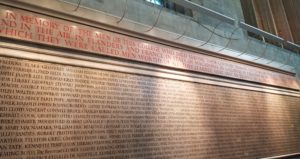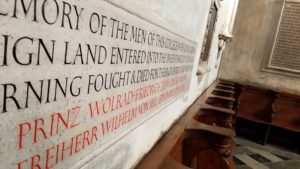I take as inspiration for this Memorial Day reflection, the previous week I spent in Oxford, England, where as God, good fortune, the generosity of the McDonald Centre and foundation, and the agreement of my chiefs—including, most ‘chiefliest’, my wife—I and my family will be moving in August. I was in-country a week, attending the McDonald Centre’s spring conference, this year on religious freedom, which also—this year—celebrates a decade of McDonald Centre activity. As would be expected at this Centre and this city, it was a heady and invigorating meeting of agile minds.
I was also there doing some basic recce: housing, schools, banking, and the like (as an aside—if you happen to know of family-oriented accommodation for rent in Oxford drop me a line!). But I also took time for a series of walking tours to familiarize myself a bit with the town that shall soon became our home. Oxford is a perambulator’s delight. There’s some several hundred years of material one could talk about following a stroll of this ancient town. I’ll indulge, here, only in one that is appropriate to the occasion of this Memorial Day.
Early in the week, Prov-friend Matt Anderson—who in addition to pursuing his DPhil at Oxford is into much, including this—took me to the New College Chapel for Evensong service. Founded in 1379, New College, among the largest of the constituent colleges making up the University of Oxford, is one of the primary choral foundations of the University. The chapel is singularly beautiful. Its most striking feature is arguably the reredos beyond the altar, which comprise more than fifty niches fitted with statues of saints, angles, and the persons of the trinity. Taken all together, it is an ample theological education.
But what I want to reflect on here is found in the narthex before the chapel doors. There, as is typical in many of the college chapels in Oxford, is a memorial bearing the names of all those Englishmen, sons of the college, who fell in the Great War. It is a staggeringly large number of lost lives, a stark reminder of the gluttonous appetite of the War that Failed to End All Wars. Such memorials, inevitably,  remind one of our own Vietnam Memorial and its own too-long rollcall of men and boys.
remind one of our own Vietnam Memorial and its own too-long rollcall of men and boys.
Over this Memorial Day weekend, Americans of all faiths or none take a moment to remember the debt the many owe to the few. There can be found in any sacrifice rightly done—that is to say, any sacrifice that is a free act of other-centered self-donation, or love—those characteristics that prove them to be of the same species as the supreme sacrifice that took place on Calvary. And there is similarity in our response as well: gratitude, of course; humility, yes; and even, one could argue—cautious lest we are misunderstood—a certain kind of worship. Like in the old wedding vow, “with my body I thee worship”, the worship owed to a fallen warrior is obviously not the veneration or adoration reserved for God. Rather it is a question of demonstrating the worth-ship of the object in question – of giving appropriate honor to someone in recognition of their merit—much as the reredos have us do as we contemplate the lives of the saints. The lives—and losses—of our military men and women can demonstrate how we are to live as Americans. Our memorializing of the fallen can demonstrate the worth, the value, of the sacrifices given for America.
I have said before that my own consciousness of this debt is reinforced by a photograph I have of my paternal great-parents. In it my forebears are standing before a wall of photos in their own home—four sons and a daughter, my grandmother. They are all in military uniform save one—he died as a toddler of a botched tonsillectomy. One among the others, and bearing the uniform of the Army Air Corp, is my great-uncle Edward, from whom I received my middle name. Ed was a gunner assigned to the 783rd Squadron of the 55thBomber Wing. He died on takeoff over the airfield in Pantanella, Italy; when a device placed by an Italian saboteur detonated, killing the crew of the B-24 Liberator. As providence would have it, Uncle Ed died during the squadron’s first-and-only mission to Slovakia—to hit a marshaling yard in Devinska Nova Ves, a suburb of Bratislava. I lived in Bratislava for more than a decade and helped build a sports and recreation program in Devinska. I knew nothing of Uncle Ed’s attempted mission while living there. And while it’s silly, the fact of it all makes me feel somehow closer to him—like I got to where he was going. But, and even better, I got to throw baseballs, not bombs. My guess is Ed would have liked that better too. Indeed, it is because of his and the greater allied effort—and, of course, the free world’s follow on efforts in the Cold War—that I, an American, could play baseball with a free and self-determining people in a formerly occupied land.
This should be something of a reminder that, very often, the bombs must come before the baseballs—war before peace. We may want peace without bombs but our enemy always has a vote. Those who do evil cannot always be talked down, they must sometimes be knocked down. That this assertion is obnoxious to some Christians means only that some Christians get violence wrong. Hamstrung by insufficiently precise tools of moral analysis, some fail to adequately distinguish between species of violence. Some killing is morally evil, some neutral, and some justified. Positive law follows natural and divine law in distinguishing unlawful killing with malice from accidental homicide and both from killing in defense of the innocent or killing as a rightly retributive act against an injustice, as in the case of justified war. So, too, does intention and disposition matter: killing can be done with malice and a cruel relish in the enemy’s anguish, or it can be done with reluctance, with a preference for the peace that might have come had the circumstances been different. The difference matters: we must be able to make for ourselves, and to help our warfighters make, basic distinctions between the use of violence that is unrestrained and morally unjustifiable and that deployment of force aimed at justifiable ends.
The distinctions are, of course, irrelevant to the ordinary radical for whom all violence is morally corrupting. To their mind, violence is simply and always morally evil and can never serve or promote moral ends. Against this, the Augustinian stream of just war realism—the peg on which this journal hangs its helmet—teaches us that violence justly deployed is never inaugural but always only responsive to an act of unjust violence already enacted or clearly imminent. It recognizes, therefore, that there are occasions in which violence—or, force—must sometimes be employed to protect the innocent from injustice. In such moments, where the simple choice between violence and non-violence no longer exists, the moral impetus to prefer the threatened innocent over the guilty aggressor is imitative of a God who ordained the sword to maintain the goods of order, peace, and justice against the chaos and evil that make a hash of life where such goods are absent.
It is right, therefore, on days of national memorial, that we commit ourselves to a moment of collective and individual reflection on the costs sometimes imposed on those who answer moral duty’s call to rise and fight, justly, when sitting and doing nothing—or nothing efficacious—is an unjust dereliction of that duty. Whether we visit cemeteries, spend time alone, cheer veterans, or simply take a moment in the midst of the busy day to take stock, it is right and meet that we pledge that the lost will remain in our memory.
In closing, I want to touch on one feature of the New College narthex that was most unexpected. On the wall at a right angle of the memorial to the Englishmen who fell in the service of their country was another, much smaller, memorial plaque to a few who fell in service to their country. The sign reads:
IN MEMORY OF THE MEN OF THIS COLLEGE WHO COMING FROM A FOREIGN LAND ENTERED INTO THE INHERITANCE OF THIS PLACE & RETURNING FOUGHT & DIED FOR THE COUNTRY IN THE WAR 1914-1919
The names on plague are notably not Anglo-Saxon. Listed together with their noble titles they are: Prince Wolrad-Friedrich zu Waldeck- Pyrmont, Freiherr Wilhelm Von Sell, and Erwin Beit Von Speyer. These young sons of German nobility felt it their own patriotic chore to fight, kill, and risk death for their own country. That this is a sentiment shared by their English classmates who similarly fought, killed, and died for the Allied cause should not be missed.
Pyrmont, Freiherr Wilhelm Von Sell, and Erwin Beit Von Speyer. These young sons of German nobility felt it their own patriotic chore to fight, kill, and risk death for their own country. That this is a sentiment shared by their English classmates who similarly fought, killed, and died for the Allied cause should not be missed.
Of course, this is not to say that shared sentiment means–or necessarily means–moral equivalence. Just as there are different kinds of killing, so too are their different kinds of patriotic service. This magazine has asserted that there are particular kinds of nationalism that can be rightly fanned and nurtured by Christian moral norms, just as there are kinds that ought to be dampened and disregarded. One can carry the flag without excessively waving it. What was in the hearts of those sons of Germany cannot be known. It is noteworthy that, to my knowledge, no similar plaque has been erected in Oxford for German students who left the university to fight in Hitler’s war. Some wars are more manifestly wrong to fight than others.
What I do want to note, in any case, is the generosity of New College to note the loss of three of their sons. They, with Germany, shared a love for those young men—even as they deployed their own sons to fight against them.
In this is a reminder—appropriate for this Memorial Day—that though we fight we do not have to hate. One can fight with a will to win, even as one fights with a will toward peace. Baseballs—however figuratively—ought to follow bombs.
—
Marc LiVecche is the executive editor of Providence
Images: The cover image of Arlington National Cemetery and details of the New College Chapel are the author’s own.







 Sponsor a student for Christianity & National Security 2024
Sponsor a student for Christianity & National Security 2024